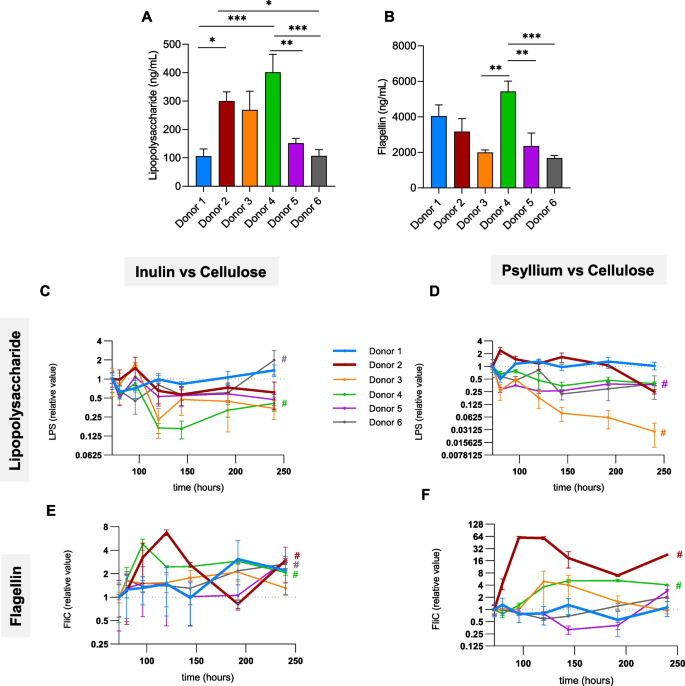💡 This study investigates the diverse impacts of soluble dietary fibers, inulin, and psyllium, on individual intestinal microbiotas from healthy subjects. Utilizing a high-throughput in vitro human microbiota modeling system (MBRA), the study reveals substantial inter-individual variation in microbiota responsiveness to fiber supplementation. Furthermore, the study demonstrates that the extent of microbiota sensitivity to specific fibers significantly influences proneness to colitis in murine models. The findings underscore the importance of personalized fiber-based interventions for individuals, shedding light on the complex dynamics between dietary fiber, the microbiota, and susceptibility to inflammatory bowel diseases (IBD).
📍 Methods:
📌 In Vitro Human Microbiota Modeling (MBRA): Fecal samples from six healthy donors were subjected to MBRA, revealing significant inter-individual variability in microbiota responses to inulin and psyllium. Metagenomic analysis was employed to identify taxonomical and functional features associated with fiber responsiveness.
📌 Mouse Transplantation Experiments: Germ-free mice were colonized with fecal samples from two donors exhibiting distinct fiber sensitivity. Mice were acclimatized on specific diets containing cellulose, inulin, or psyllium. Colitis was induced using dextran sodium sulfate (DSS).
📌 Bioactive Molecule Quantification: Fecal bioactive flagellin and lipopolysaccharide (LPS) levels were quantified using mammalian cells, revealing potential markers of microbiota-fiber interactions.
📍 Key Scientific Findings:
📌 Inter-Individual Variation in Microbiota Responsiveness: Significant heterogeneity observed in the responsiveness of individual microbiotas to soluble fibers (inulin and psyllium) using an in vitro human microbiota modeling system (MBRA).
While some donors exhibited substantial fiber-induced changes in microbiota composition, pro-inflammatory potential, and metabolomic profile, others displayed minimal impact, highlighting the personalized nature of microbiota-fiber interactions.
📌 Microbiota Sensitivity Influences Colitis Severity: Mice transplanted with fiber-sensitive microbiotas exhibited colitis highly modulated by soluble fiber consumption.
Mice receiving fiber-resistant microbiotas displayed consistent colitis severity regardless of fiber exposure, emphasizing the critical role of individual microbiota composition in shaping colitis susceptibility.
📌 Specific Fiber Impacts on Colitis Severity: Inulin supplementation exacerbated DSS-induced colitis in mice transplanted with fiber-sensitive microbiota.
Psyllium supplementation provided protection against intestinal inflammation in mice colonized with fiber-sensitive microbiota, revealing distinct and context-dependent effects of different soluble fibers.
📌 Metagenomic Analysis Reveals Microbial Features Associated with Fiber Responsiveness: Identification of 𝘍𝘢𝘦𝘤𝘢𝘭𝘪𝘣𝘢𝘤𝘵𝘦𝘳𝘪𝘶𝘮 𝘱𝘳𝘢𝘶𝘴𝘯𝘪𝘵𝘻𝘪𝘪 as a key bacterium present in all fiber-resistant microbiotas and absent in fiber-sensitive microbiotas.
Fiber-resistant microbiotas displayed an increased abundance of 𝘍𝘢𝘦𝘤𝘢𝘭𝘪𝘣𝘢𝘤𝘵𝘦𝘳𝘪𝘶𝘮 𝘱𝘳𝘢𝘶𝘴𝘯𝘪𝘵𝘻𝘪𝘪-derived CAzymes (carbohydrate-active enzymes) involved in dietary glycans fermentation and short-chain fatty acid (SCFA) production.
📌 Species-Dependent Fiber Sensitivity: Increased abundance of CAzymes from specific microbiota members (𝘉𝘢𝘤𝘵𝘦𝘳𝘰𝘪𝘥𝘦𝘴 𝘵𝘩𝘦𝘵𝘢𝘪𝘰𝘵𝘢𝘰𝘮𝘪𝘤𝘳𝘰𝘯, 𝘉𝘢𝘤𝘵𝘦𝘳𝘰𝘪𝘥𝘦𝘴 𝘰𝘷𝘢𝘵𝘶𝘴, 𝘙𝘶𝘮𝘪𝘯𝘰𝘤𝘰𝘤𝘤𝘶𝘴 𝘨𝘯𝘢𝘷𝘶𝘴, 𝘢𝘯𝘥 𝘙𝘰𝘴𝘦𝘣𝘶𝘳𝘪𝘢 𝘪𝘯𝘵𝘦𝘴𝘵𝘪𝘯𝘢𝘭𝘪𝘴) observed in fiber-sensitive microbiotas.
Suggests that microbiota-derived CAzymes’ involvement in fiber sensitivity occurs in a species-dependent manner.
📌 Implications for Personalized Fiber-Based Interventions: Study supports the notion that soluble fiber impacts on microbiota composition and function are highly donor-dependent.
Proposes the possibility of personalized fiber-based interventions for individuals based on their microbiota composition, emphasizing the need for broader studies with different soluble fibers in larger cohorts.
📍 The study provides crucial insights into the personalized and complex interactions between soluble dietary fibers, the intestinal microbiota, and susceptibility to colitis. By uncovering the diverse impacts of inulin and psyllium on individual microbiotas, the findings pave the way for personalized fiber-based interventions, particularly relevant for patients with inflammatory bowel diseases. Further exploration of the mechanisms underlying microbiota-fiber interactions is essential for developing targeted interventions for both IBD patients and healthy individuals.
Link to the article : http://tinyurl.com/4kxpxyz7
